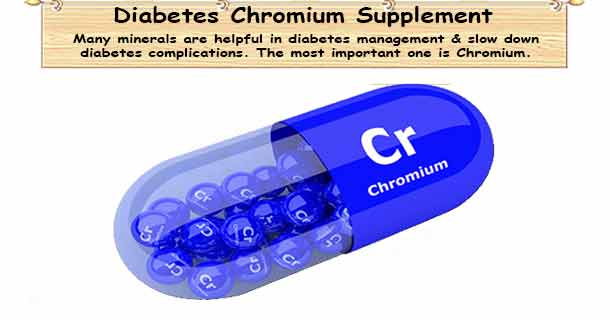Many minerals are helpful in diabetes management, and it can slow down diabetes complications. One of the most important such minerals is Chromium.
Chromium and Diabetes
Chromium is an important supplement for diabetes, because its function is to convert a carbohydrate into glucose. Chromium helps in the regulation and production of insulin (hormone). Research shows that chromium is vital for effective function of insulin hormone; insulin would not work properly without chromium. In addition, it improves the body’s ability to utilize (burnt) glucose.
Thus, a chromium supplement improves glucose tolerance and helps to attain a normal blood-glucose level in blood. It enhances insulin secretion and decreases triglycerides. Chromium also appears to be directly involved in carbohydrate, fat, and protein metabolism.
Chromium mechanism of action
Chromium appears to act by enhancing insulin’s actions. Chromium’s actions may be due to an increase in the number of insulin receptors, increased binding of insulin to the insulin receptor, and increased activation of the insulin receptor in the presence of insulin.
Why is diabetes requiring chromium supplements?
There is no study confirms the evidence that diabetics have increased rates of chromium deficiency. Still micronutrient deficiencies are frequently among diabetics, because risk factors for chromium deficiency are stress, infection, and heavy exercising.
Chromium deficiency impairs the body's ability to use glucose to meet its energy needs and raises insulin requirements. Therefore, chromium supplements may help to control type 2 diabetes or the glucose and insulin responses in persons at high risk of developing the disease.
Hypoglycemia and chromium
A study to determine if chromium is involved in hypoglycemia, eight female patients with frequent hypoglycemia symptoms were supplemented with 200 micrograms of chromic chloride for three months. Chromium supplementation eliminates the hypoglycemic symptoms. Chromium supplements significantly improve insulin binding to red blood cells and insulin receptor number. This study suggests that impaired chromium nutrition may be a factor for the cause of hypoglycemia instances.
Recommended dose of Chromium
Chromium deficiency may lead to impaired glucose tolerance. Adequate intake (AI) of chromium for women is 25 micrograms and for men is 35 micrograms. There is no estimate for the tolerable upper level (UL) for chromium.
Numerous research studies confirm that high level of chromium (200 to 1000 micrograms of chromium picolinate/day) supplement intake helps to decline HbA1c, fasting blood-glucose, oral glucose tolerance, and cholesterol levels.
What are the health risks of too much chromium?
Very few serious side effects have to link with too many intakes of chromium, so there has been no Upper Intake Level (UL) established for chromium. A UL is the maximum allowable daily intake of a nutrient that is may cause adverse health effects.
There are few reports of kidney and liver damage in patients who are in chromium supplements. So it is advised to those who already have kidney or liver problems should stop taking chromium supplement instead they may have considered to take foods richer in chromium.
Chromium might affect brain chemistry and might make behavioral or psychiatric conditions worse. If you have these conditions, be careful when using chromium supplements.
Medications that may interact with chromium supplements
Below mentioned medications may interact with chromium supplements, thus alter the chromium absorption or the medication’s effect may be enhanced.
- Antacids
- Corticosteroids
- H2 blockers (such as cimetidine, famotidine, nizatidine, and rantidine)
- Proton-pump inhibitors (such as omeprazole, lansoprazole, rabeprazole, pantoprazole, and esomeprazole)
- Beta-blockers (such as atenolol or propanolol)
- Corticosteroids
- Insulin
- Nicotinic acid
- Nonsteroidal anti-inflammatory drugs (NSAIDS)
- Prostaglandin inhibitors (such as ibuprofen, indomethacin, naproxen, piroxicam, and aspirin)
Too much of chromium may decrease zinc absorption. Vitamin C and aspirin may enhance chromium absorption.
Natural sources of Chromium
Natural sources of chromium are whole grains, cheese, dried beans, nuts/seeds, mushrooms, Apple peel, banana, beef, wheat germ, brown sugar, butter, dairy products, mushrooms, oat straw, oysters and broccoli, as well as brewer's yeast, certain beers and wines.
Chemical form of Chromium supplement
Chemical forms of chromium are chromium picolinate, chromium nicolinate, chromium nicotinate, chromium (III) chloride hexahydrate, chromium amino acid chelate, GTF chromium.

